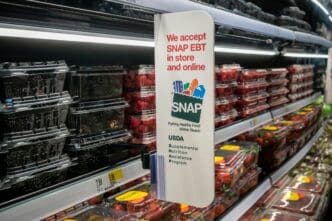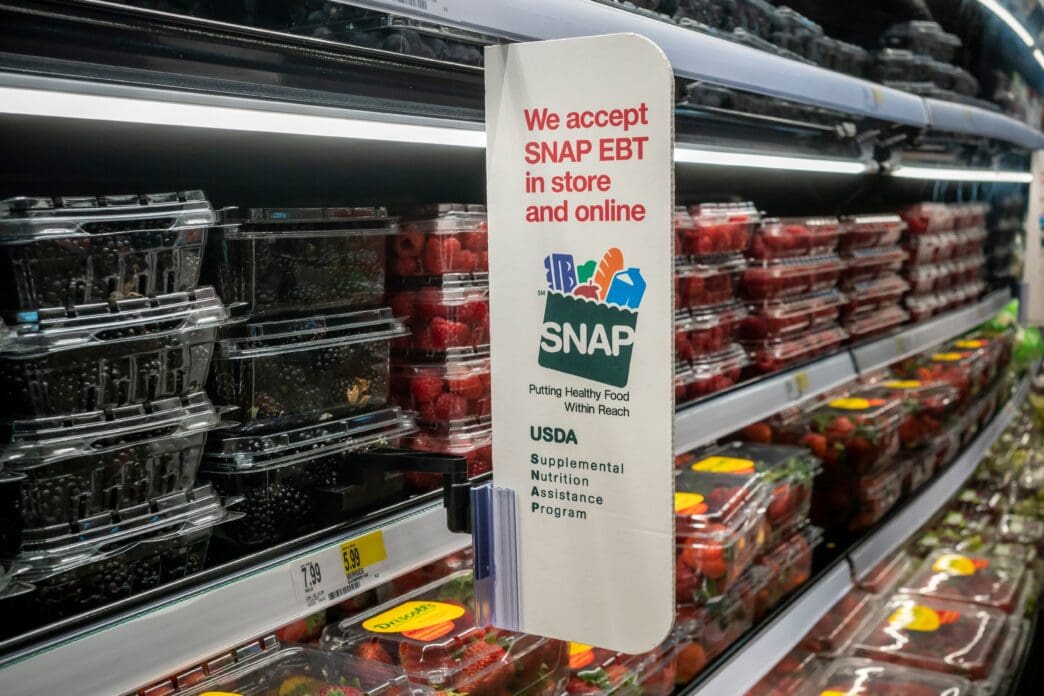Executive Summary
- A federal judge ordered the Trump administration to disburse full Supplemental Nutrition Assistance Program (SNAP) benefits for November to nearly 42 million Americans, ruling it acted “arbitrarily and capriciously.”
- The ruling mandates the government tap into billions from a separate U.S. Department of Agriculture (USDA) child nutrition fund to ensure full SNAP payments by Friday.
- The judicial intervention addresses the Trump administration’s initial halt and subsequent proposal for only partial SNAP funding amid an ongoing government shutdown, causing distribution delays for states.
The Story So Far
- The federal judge’s order for the Trump administration to disburse full Supplemental Nutrition Assistance Program (SNAP) benefits for November stems from an ongoing government shutdown that led to the initial halting of payments and subsequent proposal of only partial funding for nearly 42 million Americans. This situation prompted a legal challenge by a coalition of cities and non-profits, arguing that the administration had failed to comply with previous court orders to expeditiously resolve payment issues, leading the judge to rule that the administration acted “arbitrarily and capriciously.”
Why This Matters
- A federal judge’s order ensures that nearly 42 million Americans will receive full November SNAP benefits, underscoring the judiciary’s critical role in protecting essential social programs during government shutdowns and compelling the Trump administration to disburse additional funds. However, this last-minute directive creates significant administrative challenges for states, potentially delaying the actual disbursement of payments to vulnerable beneficiaries.
Who Thinks What?
- U.S. District Judge John McConnell ruled that the Trump administration acted “arbitrarily and capriciously” by initially halting and then only partially funding Supplemental Nutrition Assistance Program (SNAP) benefits, ordering the full disbursement of November payments by tapping into additional USDA funds.
- The Trump administration, represented by Justice Department lawyers, initially halted November SNAP benefits due to a government shutdown, then proposed partial funding from a contingency fund, and opposed using child nutrition funds for SNAP, arguing it would endanger school meal programs.
- A coalition of cities, non-profits, unions, and small businesses initiated the legal challenge, arguing that the administration was not complying with previous court orders to “expeditiously” resolve payment issues and ensure full SNAP benefits.
A federal judge in Rhode Island has ordered the Trump administration to disburse full Supplemental Nutrition Assistance Program (SNAP) benefits for November to nearly 42 million Americans, ruling that the administration acted “arbitrarily and capriciously” by initially halting payments and then proposing only partial funding. U.S. District Judge John McConnell issued the directive on Thursday, November 6, 2025, emphasizing the urgency of providing aid to recipients amid a government shutdown that had depleted program funds.
Judge McConnell’s ruling mandates that the government tap into billions of additional dollars held by the U.S. Department of Agriculture (USDA) from a separate fund to ensure full SNAP benefits are paid. These payments are required to be made to states, which administer the program, by Friday.
Judicial Scrutiny and Administration’s Actions
The judge’s order follows a series of escalating legal actions. The Trump administration had initially taken the unprecedented step of halting November benefits, citing a lack of funding during the ongoing government shutdown. In response to an earlier order from Judge McConnell, the administration then stated it would provide only partial benefits, utilizing $4.65 billion from a SNAP contingency fund.
During the hearing, Judge McConnell repeatedly criticized the administration’s attorney, stating that the government had not acted quickly enough to ensure funds reached recipients. He also found that the administration had acted “arbitrarily and capriciously” in its decision not to provide full benefits earlier in the week.
A coalition of cities, non-profits, unions, and small businesses initiated the legal challenge, arguing that the administration was not complying with previous court orders to “expeditiously” resolve payment issues. Judge McConnell concurred, noting that the administration had failed to either make full payments by a specified deadline or resolve administrative burdens promptly.
Funding Disputes and Impact on Beneficiaries
The administration had opposed using nearly $17 billion from a child nutrition fund for SNAP, arguing it would endanger the nation’s free and reduced-price school meals program. However, Judge McConnell pointed to the USDA’s decision to transfer $750 million from that same fund to the WIC food assistance program, stating this undermined their argument against using it for SNAP payments.
Justice Department lawyers, representing the administration, maintained that they had resolved all government-responsible burdens by releasing contingency funds and providing guidance for calculating reduced payments. The government has the option to appeal McConnell’s order to the First Circuit Court of Appeals.
State-Level Challenges and Delays
The rapidly evolving legal landscape has created significant challenges for states, which are responsible for distributing SNAP benefits. States must reprogram their systems to recalculate payments, a process that has caused delays for beneficiaries.
Initially, the USDA provided guidance for issuing benefits at half the maximum allotment. This was followed by an announcement that 65% of maximum benefits could be paid from the contingency fund, requiring another round of recalculations. Judge McConnell’s subsequent order for full payments necessitates further adjustments.
States like Illinois anticipated beneficiaries would see payments by Friday, while North Carolina and Massachusetts expected assistance the following week. Pennsylvania indicated that its complex process would delay aid for several weeks, with other states unable to provide clear timelines for distribution.
Looking Ahead
This judicial intervention marks a significant development in the ongoing efforts to secure federal food assistance during the government shutdown. The ruling underscores the critical role of judicial oversight in ensuring that essential social programs continue to serve millions of vulnerable Americans, despite political impasses.








